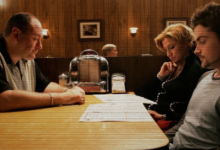Breaking Bad & The Sopranos Have a Secret Connection That Goes Over Most Fans’ Heads

Breaking Bad was the flawless crime drama television series that took the reins as the best television show made. It pulled numerous forms of inspiration from all the great television shows before it as well as styles from different directors. The Sopranos changed the formula of television entirely, which continually inspired crime dramas that came after it. Almost every crime drama after The Sopranos included brilliant character arcs, displays of violence, and a deep reflection on morality within the world of crime. Breaking Bad took many things on as inspiration from The Sopranos.
Sometimes the inspiration of a television show in another show is subtle and baked in. Whether it was intentional or not, The Sopranos and Breaking Bad share the episode title “Live Free or Die” in their final seasons. Both episodes establish two important characters from each show escaping to New Hampshire in an attempt to avoid the consequences of their actions. Fitting for the characters, New Hampshire’s motto is “Live Free or Die.” While both characters, Walter White and Vito Spatafore, have different motivations, their remaining arcs within these shows are very similar. Both episodes juggle themes of going back and facing the problems that their characters left behind, ultimately leading to their deaths in later episodes of the final seasons of their shows.
“Live Free or Die” Establishes a Small Storyline That Is Expanded Later in Their Seasons

In The Sopranos episode “Mr. & Mrs. John Sacrimoni Request…” Vito Spatafore leaves a wedding for Johnny Sacrimoni’s daughter early, claiming he was feeling ill. He seems fidgety and uncomfortable, but when he gets home he tells his wife that he needs to do some money pick-ups. Members of the Lupertazzi crime family are at a gay club doing pick-ups as well, and they bump into Vito. However, Vito isn’t doing the same as them; he’s sporting a leather outfit and fooling around with another guy on the dance floor, which shocks the Lupertazzi men. Vito tries to play it off as a joke but realizes this information about his sexual orientation will cause issues within the crime families. So, in “Live Free or Die,” Vito decides to escape to New Hampshire to try to figure out his life.
In the Breaking Bad episode “Face Off,” the chaotic war between Walter White and Gustavo Fring draws to a close and Skyler, Walter’s wife, calls him panicked about the news on TV related to Fring’s death. Skyler asks Walt if he had anything to do with the events on TV, and he simply responds with, “I won.” Walt’s actions against Gustavo Fring brought dire consequences for his meth empire in the final season of the show. In the episode “Live Free or Die,” an older Walt, who seems to be celebrating his birthday, is seen at a Denny’s diner. The flash-forward introduction of the “Live Free or Die” episode shows Walt with a new car that has New Hampshire license plates and a new photo ID with a new name. It isn’t until the episode “Granite State” that the audience sees Walt flee to New Hampshire to lie low from the law.
“Live Free or Die” Sets Into Motion the Final Arcs of Major Characters

In The Sopranos, Vito tries to settle into his new life in New Hampshire, doing his best to “live free” like the motto of New Hampshire implies. He slowly opens up to and gets close to Jim Witowski, a diner owner and volunteer firefighter. As Vito explores the town he fled to, he notices how freely gay couples walk around without fear. For the first time in a long time, he finally feels like he can be comfortable in his sexuality, which is frowned upon back among his crime associates. However, the stress and worry of the life he left behind fester in him, causing him to drink heavily. After moving in with Jim, Vito starts to feel at home with this new relationship but still yearns for the life he left behind in New Jersey.
In Breaking Bad, after Walt is relocated to New Hampshire, Edward Galbraith, also known as the Disappearer, sets Walt up in a remote cabin. Edward warns him not to leave because it will without a doubt get him caught. The amount of money Walt had paid him and the amount of effort Edward put toward Walt’s protection would be in vain. Walt debates heading into town initially and fearfully holds out for the time being. When Edward revisits Walt after a month, he provides some updates on his family, which prompts Walt with a game plan to send money to Walter Jr. back in Albuquerque, New Mexico. When Walt secretly calls Walter Jr., his son curses him out due to the events of the episode “Ozymandius,” and tells Walt that he wants nothing to do with him, which breaks Walt’s heart.
At this point in both Vito and Walt’s story arcs, they’ve begun to workshop ideas on how to get back to their old lives. They’re both living under alternative identities. Vito is pretending to be a man named Vincent, while Walter White is Mr. Lambert on his fake ID. While they took some time to acclimate to their new environment, they began to realize that they were not living free, prompting both of them to eventually return to their original homes.
The Consequences of Both Character’s Actions Lead to Their Demise

In The Sopranos, Vito is hired as a freelance handyman but is quickly exhausted by the workload that it entails. The life of captain and top earner in the DiMeo crime family didn’t involve nearly as much work as his new life, so he eventually decides to leave. One morning, Vito leaves without saying anything to Jim, who wakes up and sees Vito’s car is no longer in the driveway. Vito heads back home to not only hopefully smooth things over with his boss, Tony Soprano, but to also get back to his old life.
Tony Soprano tries to weigh the pros and cons of letting Vito back in but ultimately decides to have Vito killed. For the sake of morale among the DiMeo associates and the intense pestering of Phil Leotardo from the Lupertazzi crime family, Tony tells Carlo Gervasi to kill Vito. Before Vito is supposed to meet his fate with Tony, Phil finds Vito and murders him in a grotesque way.
In Breaking Bad, Walt tries to lie low with his new life in New Hampshire but feels there’s way too much unfinished business left for him in Albuquerque. After marching eight miles into town to contact his son, he’s left defeated by his son’s hatred. He calls the DEA in Albuquerque from the New Hampshire bar in town and leaves the phone off the hook so that they can trace his location. He orders his last drink, and the bartender flips through the channels. When he sees his former science associates, Gretchen and Elliot, he is enraged by their discrediting of him, so rather than surrender to the police, he decides to go back to Albuquerque. Walt puts together a plan to get money for his children without alerting the authorities, unintentionally helps free Jesse while killing the neo-Nazis who stole his money, and meets his fate when a stray bullet kills him.
In The Sopranos and Breaking Bad, both Vito and Walter try to set up new lives and let the past be the past, but knowing how much they left behind, they just can’t. With unfinished business driving them both back, they felt magnetized to return to their homes. Vito just couldn’t get used to a lifestyle outside the mafia, while Walt just wanted to make things right for his family. In the end, their returns cost them their lives. For Vito, he was hoping for a better outcome, while for Walt, he was ready to give his all to get revenge on the ones who did him wrong.
The motto for New Hampshire was written in 1809 by General John Stark, who served in the American Revolutionary War. His sentiment was that death was not the worst option when fighting to live free. The motto has been on the New Hampshire license plate since 1971. Vito Spatafore and Walter White did everything to live by New Hampshire’s motto in the end, but lost their lives fighting for their freedom.
For the final seasons of Breaking Bad and The Sopranos, morality and mortality were heavy themes. The actions of many characters tugged on the idea of whether they were still acting within a moral code or deserved their untimely fates in the end. Before Bryan Cranston knew the fate of his character Walter White in Breaking Bad, he had a completely different idea and told Rolling Stone:
My guess would have been that Walt survives. The one person who should die, because of the toxicity he’s created, who almost wishes he would die.
While his guess was off, it fit the reflections of morality as his death was one among many throughout Breaking Bad’s last season. The same goes for the end of The Sopranos, whose final season racked up numerous killings of major characters and an ambiguous ending for the main character.

